CORRECTION: A previous version of this article stated that the university spends $20 million each year on financial aid. However, Chancellor Daniel Diermeier incorrectly spoke: the university spends $200 million each year on financial aid.
As he enters his third year at Vanderbilt, Chancellor Daniel Diermeier met with The Hustler to reflect on the past year and look ahead to the university’s future.
During the Oct. 4 interview, Diermeier discussed the future of residential life at Vanderbilt, the university’s separation from VUMC and changes in a post-COVID-19 campus.
Vanderbilt Hustler: In the first full semester largely without COVID-19 restrictions/major concerns since Fall 2019, is there any data available yet that shows the impact of these new policies? (For example, has the university seen fluctuations in event attendance, course interest, higher percentage of students picking earlier/later course times, usage of the Rec, etc?)
Diermeier: We’re glad to be back. It’s a little early to have any specific data on that, but what my impression has been, and I’ve heard this from a variety of people I talked to, there’s a real sense of excitement and almost eagerness to be back together and to experience the campus as what it was meant to be. I think it’s more, at this point, atmospheric and anecdotal. We had a wonderful Move-In Weekend, for example; it was great excitement. Super exciting for incoming freshmen and parents, great support from our students and that energy level has really continued now.
We’ll continue to monitor the situation as we’ve always done, and we’ll make sure that we’re ready as situations warrant. This is always an approach we have taken through our COVID-19 pandemic. We’ll put our mission first, and we’ll pay attention to what the best public health information is, and act accordingly in our partnership with the medical center.
Recently, VUMC has come under the threat of investigation by Tennessee lawmakers, which has sparked a lot of concerns among LGBTQIA+ students on campus for their safety and belonging. How does Vanderbilt intend to support these students?
You’ve probably seen the message that we sent to the community a couple of weeks ago—we’re fully committed to supporting our LGBTQ+ students through a variety of measures like we always do, and that commitment is strong. No matter what the circumstances are, we’ll reaffirm that as needed. It’s also important to understand what the relationship we have with the medical center is. We are two separate nonprofit institutions, and we went into a separation agreement about six years ago. We do lots of things together, and we have close connections, particularly on the education and on the research side. But when it comes to clinical care, that is really the area where the medical center makes decisions as they see fit. We support them, we partner with them and we collaborate with them.
You mentioned how VUMC is separate from the university and how that was a recent split. What was the reasoning behind separating from VUMC? What kind of advantages or disadvantages come with that new relationship?
This is a very complex issue— to think about medical centers in the context of the university. Most medical centers have fully integrated inside a university. So they’re like the law school, for example— they’re just one thing that the university does. But in addition to research and education, it also provides clinical care, and there are legal subtleties to exactly how that’s organized. Then, there are some universities where the hospital or the medical center is separate. The question is: what’s the right way to think about it? Why do it one way or the other way?
The challenge if the medical center is part of a university is that the incentive and rationale post-Affordable Care Act for medical centers is to grow. So just to give you one example, medical centers do very complex surgeries; we are the leading transplant center in the world. But in order to do the most complicated things, you have to do a lot of transplants. So, having a large transplant volume is really good because then the surgeons develop specialized expertise because they see more complicated cases. That’s one reason you also wanted to have more clinical trials—all these are reasons to be big. Now, from the university’s point of view, you now have a medical center that is maybe 75% of your total revenue. And medical center revenue is much more volatile than the other revenue sources that we have, compared to tuition that’s pretty predictable. Medical clinical review is very, very volatile. That makes it very hard for universities to do long-term planning because you always have to worry about the volatility of the medical center.
So, the standard is that the medical center wants to grow, but there is more risk involved in how they operate. Universities like ours, we don’t want to grow in size dramatically, maybe grow a little bit, but not much. We love the size that we have. So you have one part of your operation that wants to grow and has high volatility, and another one that wants to get better and improve what it is doing but doesn’t want to grow. That suggests you split. How you do the separation is hugely important. Our team that worked on this six years ago did a phenomenal job on that. We have deep relationships with the medical center; we have what’s called academic affiliation agreements. If you are a transplant surgeon working at the medical center, you’re an employee of the medical center, but you’re faculty at Vanderbilt. So your research goes to Vanderbilt University and if you’re teaching medical students, that’s done to the university as well. The entire academic side is at the university, and the clinical side is at the medical center.
It’s a great model because it preserves the research and educational unity and allows the medical center to make its decisions on the clinical side (how much they want to invest and grow) without being constrained by the different needs that the university has to deal with.
We have great relationships between me and Jeff Balser, the president and CEO of VUMC. All these things are important to make this work because we want to make sure that we stay one Vanderbilt, that we can operate as a unit and make the types of investment that makes sense in each specific environment.
In the same vein of healthcare, the university has made a number of changes to reproductive and maternal healthcare resources this year. How has the university’s approach to this care shifted after the reversal of Roe v. Wade?
The well-being of our community always comes first, whether that is staff members, faculty members or students, and then we always we have to adjust how we provide that support and have provided care given changing circumstances. This was a changing circumstance on the legal side. And so we had a task force that included staff, faculty and students to think this through. We got a head start, and we were able to execute this very well. The task force did a phenomenal job. Just to highlight a couple of the components, we expanded parental leave for staff from two to eight weeks. We also hired a new women’s health coordinator in the Office of Health and Wellness who can provide confidential counseling and support for anybody that has questions. We’ve also expanded support on the student, staff and faculty sides, including support for medical procedures that cannot be provided in the state of Tennessee. Whenever students have questions or anything like that, they can directly talk to the Office of Health and Wellness, or just any other of the resources that we have within the Student Care Network to make sure that they understand what’s available, what the benefits are and how to access them best.
A lot of people have been kind of talking about different things that the task force has done and wondering how they came to these ideas. What kind of input was curated to come up with those ideas, what kind of people were talking to you and what kind of people were included in those conversations?
We wanted to make sure that we had broad representation. We wanted to make sure that their perspectives are represented and of course, undergraduate student needs are different than postdoc needs and so on. We put these task forces together and we have conversations. On the faculty side, we may talk to a dean—someone who’s really an expert on this, who can help us think this through. It’s quick, it’s efficient. I’m really pleased with how quickly, effectively and efficiently the task force was able to come together, do its work and come back with practical and implementable solutions that benefit our entire community.
You mentioned that students were put into consideration when forming the task force. As the members of the task force are, from what I understand, faculty and administrators, can you describe how student input was considered by the task force?
We always try to get student input. Say we had a student life task force—that particularly affects students, so we definitely want to have students be involved with that. When people hired me, there was student input; there was a whole student advisory group. It’s always a question about what’s the specific task that the task force has to do? We always try to get student input, and then exactly how these things are configured just depend on the specifics of it.
From the recent announcement of President Biden’s loan forgiveness program to multi-million dollar donations for internship funding at Vanderbilt, how is the university approaching financial accessibility for students, especially in the wake of a lawsuit regarding financial aid collusion?
We are very proud of our financial aid program. We spend over $200 million every year in financial aid for students, and we are widely recognized as one of the leading financial aid programs. The Princeton Review rated us No. 1 in financial aid, and so we’re very proud of that.
Vanderbilt is a leading program; it’s well designed, and it supports our students so that, irrespective of financial background, everyone can attend Vanderbilt and leave the university debt free. It’s need-blind and a no-loan program, which only very few universities offer. We are very proud of this program. We think it really has had a dramatic impact on which students have been able to attend Vanderbilt.
It is also importantly supported by philanthropy. Sometimes people think the endowment is just kind of a big bank account, but the endowment is actually put toward around 3,000 different funds. A large part of that is supporting students directly. Some of our alumni or other supporters want to support students, so they provide a donation to the university that goes into the endowment fund. There’s a very diverse set of universities. And that’s one of the strengths of U.S. higher education: diversity. There are our peer groups, elite private research universities, that have, through their commitment and through their support of their property community, been able to provide education, debt free for their students. But of course, at the other universities where that’s not the case, students accumulate significant amounts of debt. They dominate the headlines, and that creates the political impetus for change and then you’re in the middle of a political debate.
We love our financial aid program. We think it’s phenomenal and we just want to do more. It’s constantly something we are heavily engaged with, especially by talking to our alums and other members of the Vanderbilt community about how special this is. Our goal is to introduce more support for our students so that we can make this even more broadly accessible.
Along those same lines, is the university able to offer any financial support to students who may have been affected by Hurricane Ian in Florida, South Carolina and Cuba or Hurricane Fionna in Puerto Rico? If so, could you tell us about those measures?
Whenever students are affected directly financially, there’s a critical support fund that they can turn to. We have students that are affected by natural disasters or family affected—that’s exactly what these emergency funds are for. We encourage those students that have concerns about that or who have family situations that have been particularly affected by natural disasters in Florida or Puerto Rico, or other parts of the world for international students, to reach out to that fund. Then, we will work with the students to support them on a case-by-case basis.
Can you tell us more about the non-financial support that you might be offering in the wake of these disasters?
We know that there are sometimes financial needs, but also we have support to otherwise deal with challenges, such as emotional support via the Student Care Center and the Office of the Chaplain. We are doing everything we can to make sure our students are able to deal with these challenging situations as well as they possibly can.
Some students and/or groups of students have expressed disappointment regarding different university responses to various issues on campus such as the VUMC allegations and reproductive healthcare, stating that the university has not taken a strong enough stance in supporting them. How do you handle this backlash? What do you suggest that students and community members do to achieve that additional support they desire if the university is not able to offer it themselves?
I haven’t heard anything that people haven’t been able to access support or anything along those lines. On the communication side, it’s always a question of what do we say and when do we talk? I think we were very forceful in our support of LGBTQ+ students. I’m not really quite sure what else people would be looking for at this point.
People can always disagree about whether we should have said it this way or the other way, but I think we’re pretty intentional about what we say. Our focus will always be to support our community—what’s our mission? What’s our purpose? How do we support our community? I think sometimes people want us to speak about broader policy issues, but our focus is on supporting the members of our community.
Pivoting to a couple of questions that we had about changes that are coming to campus this year, Campus Dining recently implemented the Vision Pass program in the commons dining hall this year. Could you talk about the goals behind starting this initiative and what kinds of expansions you might be anticipating in the future?
This was an initiative to make it more convenient for students and reduce wait times. From what we hear, it’s going well, but this is something that we would look at. It’s one component of an ongoing effort to improve what we do on the dining side. I think it was a good idea to try this out, so we’ll see how it goes, and then we can adjust.
With Residential College C in the process of construction as well as the announced demolition of Highland Quad in the coming years, can you speak to the university’s vision of residential life in the near future and what students should expect?
We love the residential college experience. We think that the experience that our first-year students have at the Martha Ingram Freshman Commons, I’m going to put that against anybody’s first-year experience in any university. I think it’s really well-designed—It creates a sense of belonging from day one. We strongly believe that for our students, particularly our undergraduates—and it’s true for graduate students too—being part of a living learning community really helps their development and helps them to unlock their potential fully. Learning happens in classrooms, but it also happens on the way back and forth from classrooms, in all sorts of other activities, and crucially happens when you live together as part of our community. Especially if there is programming and activities from residential faculty and there’s a thoughtful way of how to structure residential life.
We want to be able to provide this for all of our students once they’re sophomores juniors, and seniors as well, and we can’t do that at this point because we don’t have enough facilities. Our commitment is to make that available to all of our students for the entire time at Vanderbilt— that’s the goal. So we’re step by step replacing, perhaps much beloved residence halls, with the residential colleges and so that’s why Carmichael Towers had to die and had to come down and get blown up. But not we have Rothschild College, and it’s a beautiful space and creates a wonderful sense of think of community right away. And Residential College C I’m sure will be just like that. The next thing for us to tackle is Highland Quad. We’re in the planning processes on that and we’re very excited about what we can do there to build community for students. It’s a multi-year process, but with we’re totally committed to providing the residential college experience for all of our undergraduates.
You may have noticed there’s another construction site on that corner of Broadway— that’s the graduate student village that is being built. We also love to provide that for graduate students because they have different needs and are at different stages in life. We want to make sure it works— some of them have kids or spouses or partners that are working. We love the idea that universities are living learning communities, and we’re totally committed to a residential college.
Considering the fact that the university is prioritizing community and living spaces as you said, can you describe the reasoning behind phasing out other types of living and communities such as McTyeire, McGill, and having a reduction in the Mayfield’s?
That is a complicated story, but we want to make sure that our students have the ability to pursue the type of experience that they want to pursue. In the residential colleges, we particularly like the fact that students from different backgrounds live together. We have Blair musicians and electrical engineers and baseball players, all in the same building because this is a very diverse student body. It’s a diverse student body in terms of background, in terms of experience and socio-economic backgrounds, but also in terms of interests and what they do.
The more we can create environments where people interact, the better. We’re going away from specialized communities to ones that are more inclusive so that we have a broader selection of students that are participating. We also realize that students have particular, specialized interests that they want to do that, but we want to do it differently than in the living learning communities. The plan is to have the non-residential college dorms phase into the residential college system.
Is there a long-term timeframe for when the university hopes to have solely residential colleges on campus?
Our goal has been to be done with all this within four to five years. A lot of things that have to go right to get there: we have to have some philanthropic support, and there are a whole bunch of approval processes to select things, sites, etc. This is a super complicated process, but we are doing this as expeditiously as we can so that we’re able to provide this for our students.
What is your favorite Vanderbilt tradition?
I love Move-In Weekend. It’s the first experience that new students and parents arriving on campus have. I love the energy that comes from the student volunteers, with their T-shirts and being heavily caffeinated already.
Last year was the first time I’d seen that. There are a lot of sophomores that volunteered, the same sophomores didn’t get it [Move-In Weekend] because of COVID. But they were still there for the community and that really was wonderful to see.
We have a lot of musical events on campus, Commodore Quake is coming up. If you could choose one musical artist to perform, who would it be?
It’d be good to have a total legend on campus. I want to have Robert Plant and Alison Krauss because I love the adventurousness of them working together, coming from totally different musical traditions.
Now that we are transitioning into the fall, do you have a favorite fall activity?
I love to go to football games. It’s a whole ritual: you go to the tailgates and reconnect with alums, then you go to the game. I’m also just starting to discover how beautiful nature is around Nashville—like just going for a walk or a hike.
Are you an NFL fan and if so, what professional team do you support?
Obviously the Titans. I do love to watch sports. When I lived in Chicago, I went to quite a couple of Bears games with my sons at the time and we had many heartbreaks. I’ve been to a couple of Titans games, and it’s a great atmosphere there. I’ve also been to like a bunch of Nashville SC games in their wonderful new stadium. And of course, our board member John Ingram is a majority owner of them—they did a wonderful job. I watched a lot of soccer when I was growing up, but the atmosphere there is tremendous. It’s both really true to the game and has local traditions like food and music.

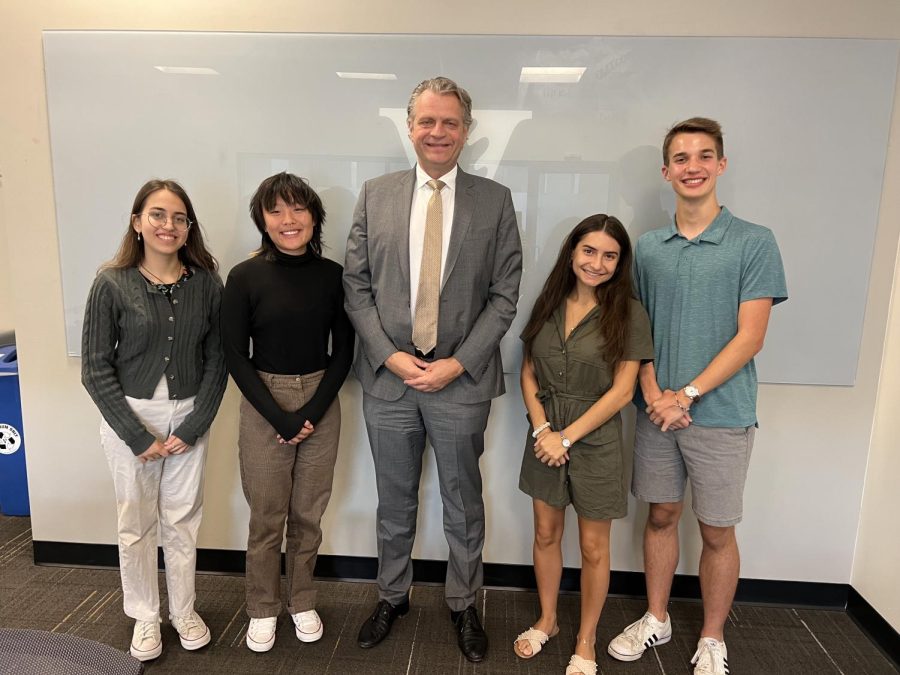




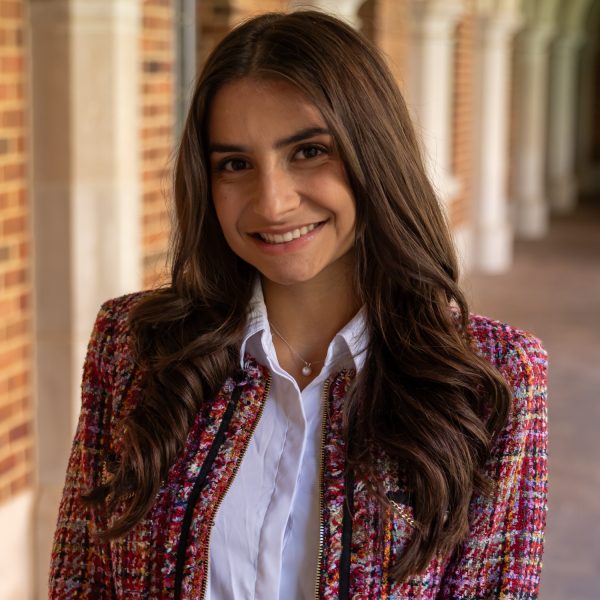
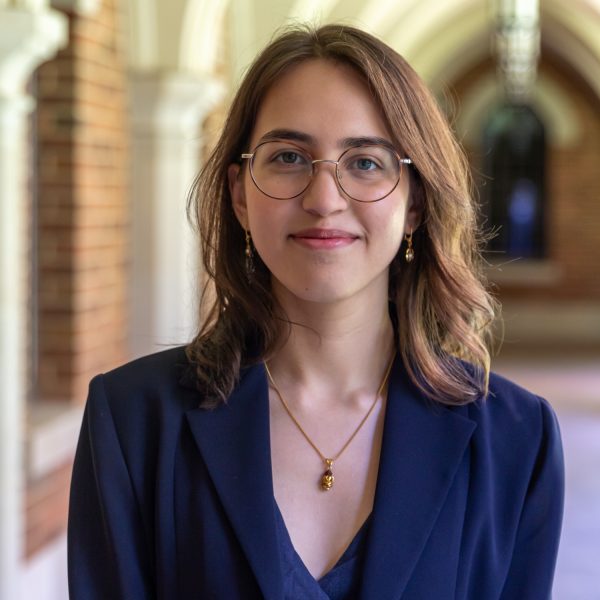
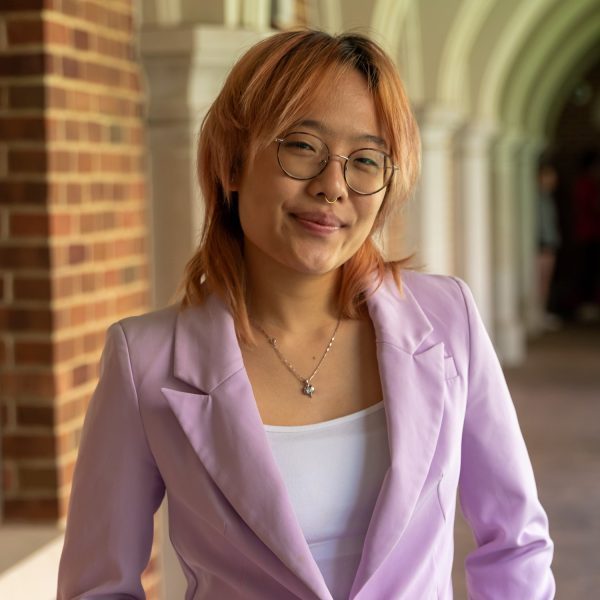

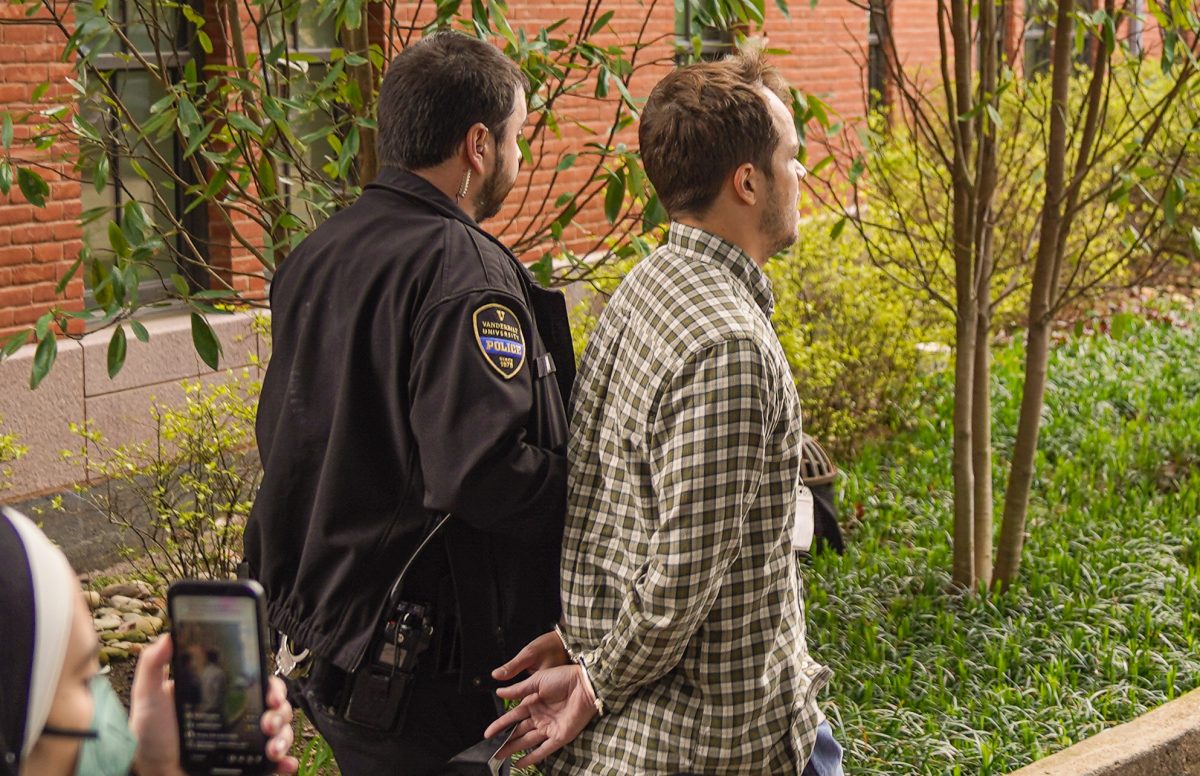
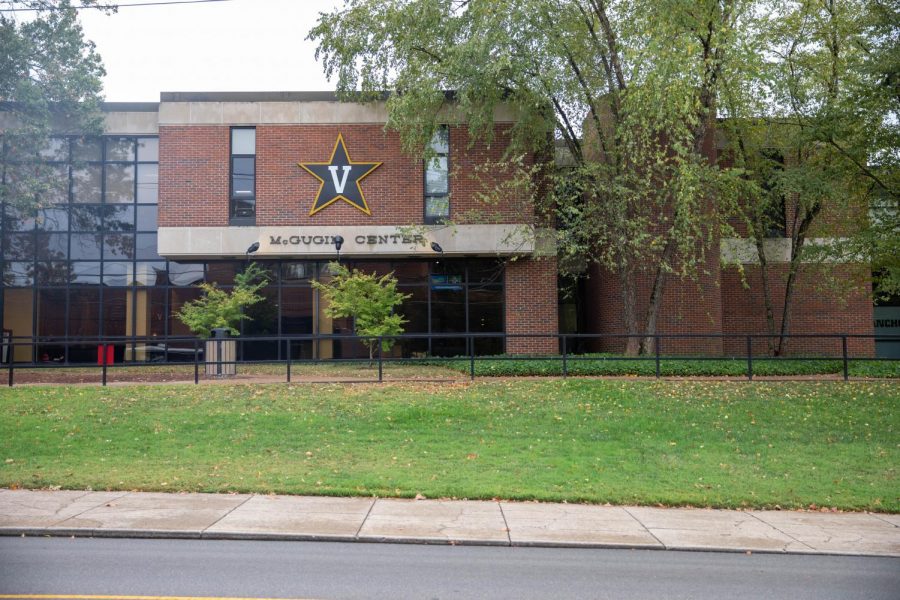
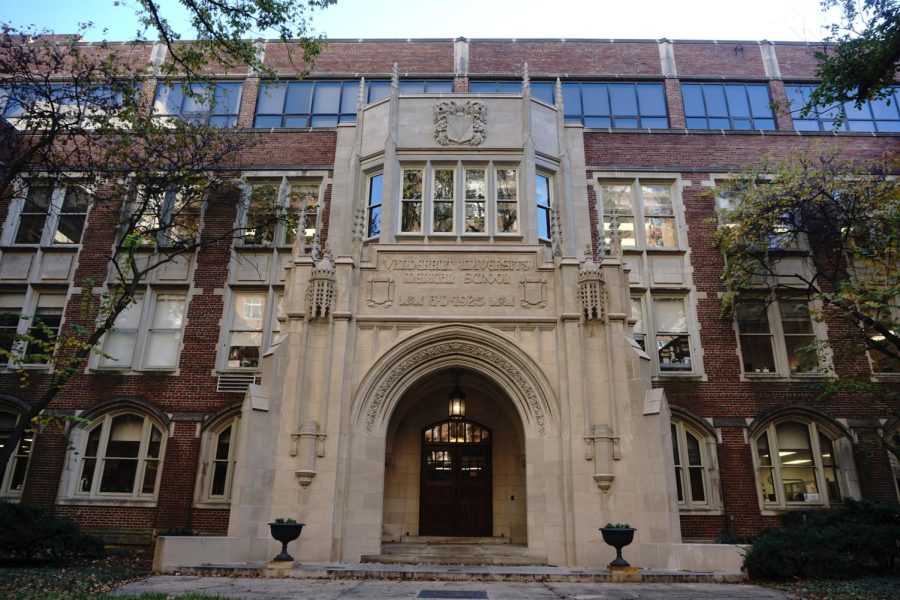
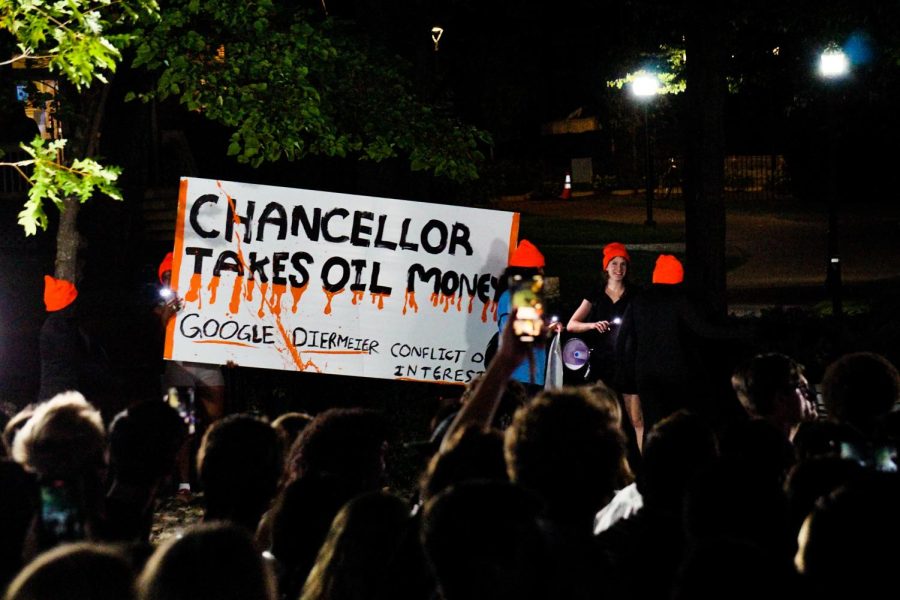

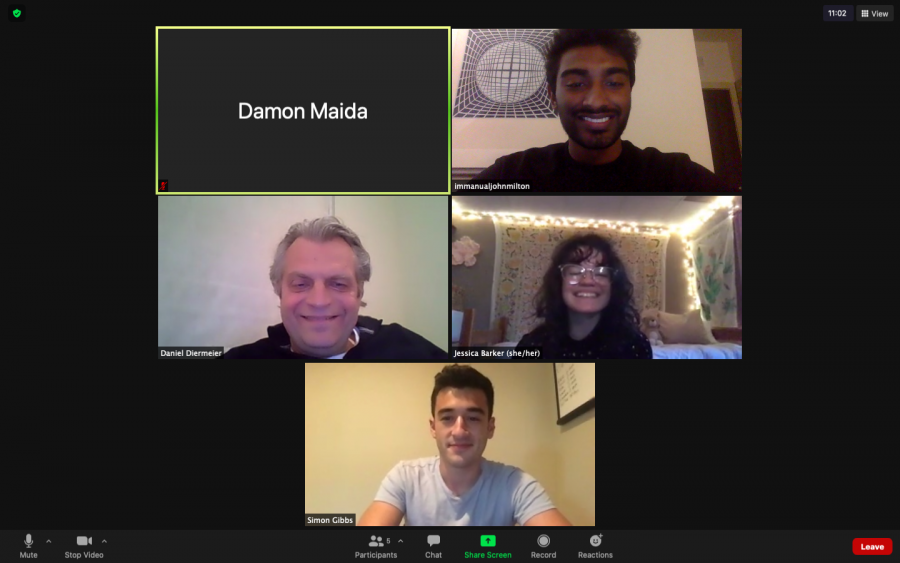
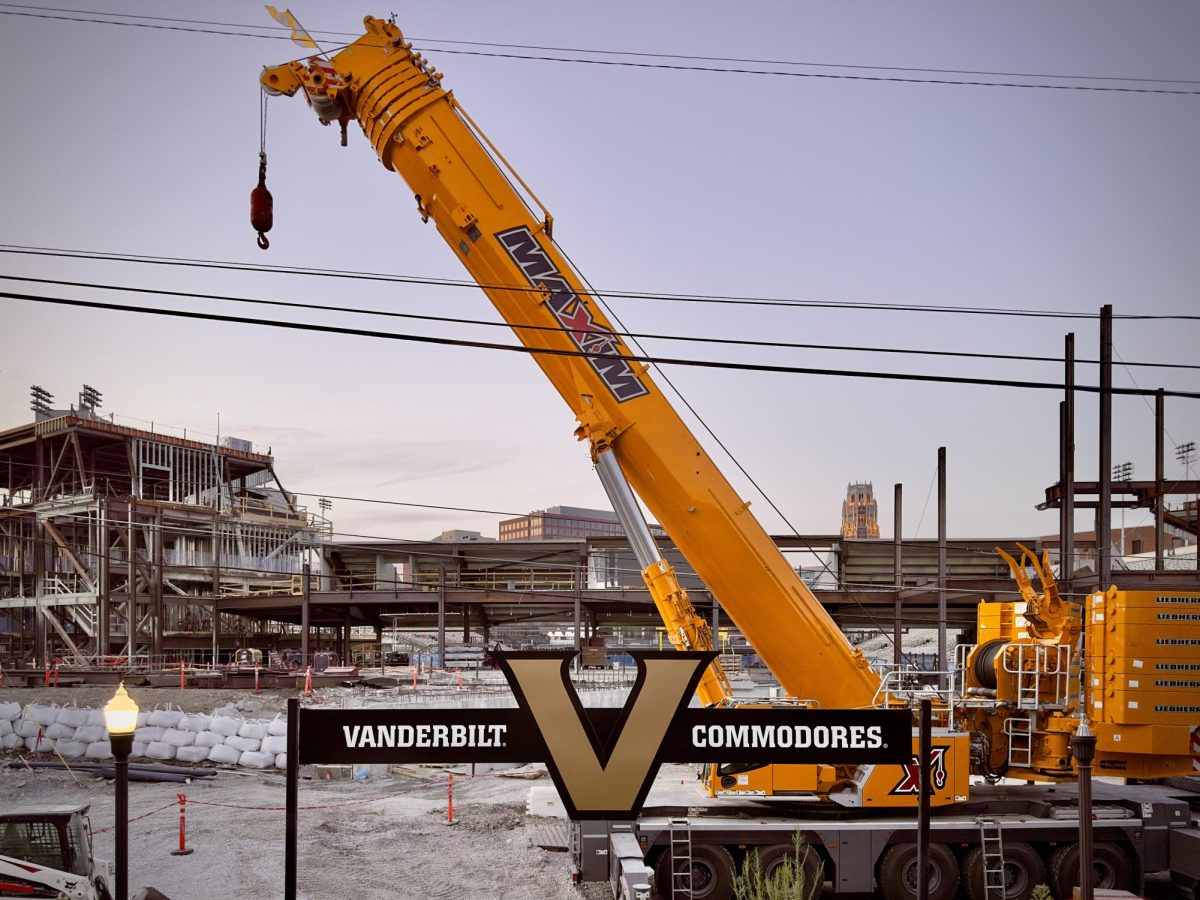

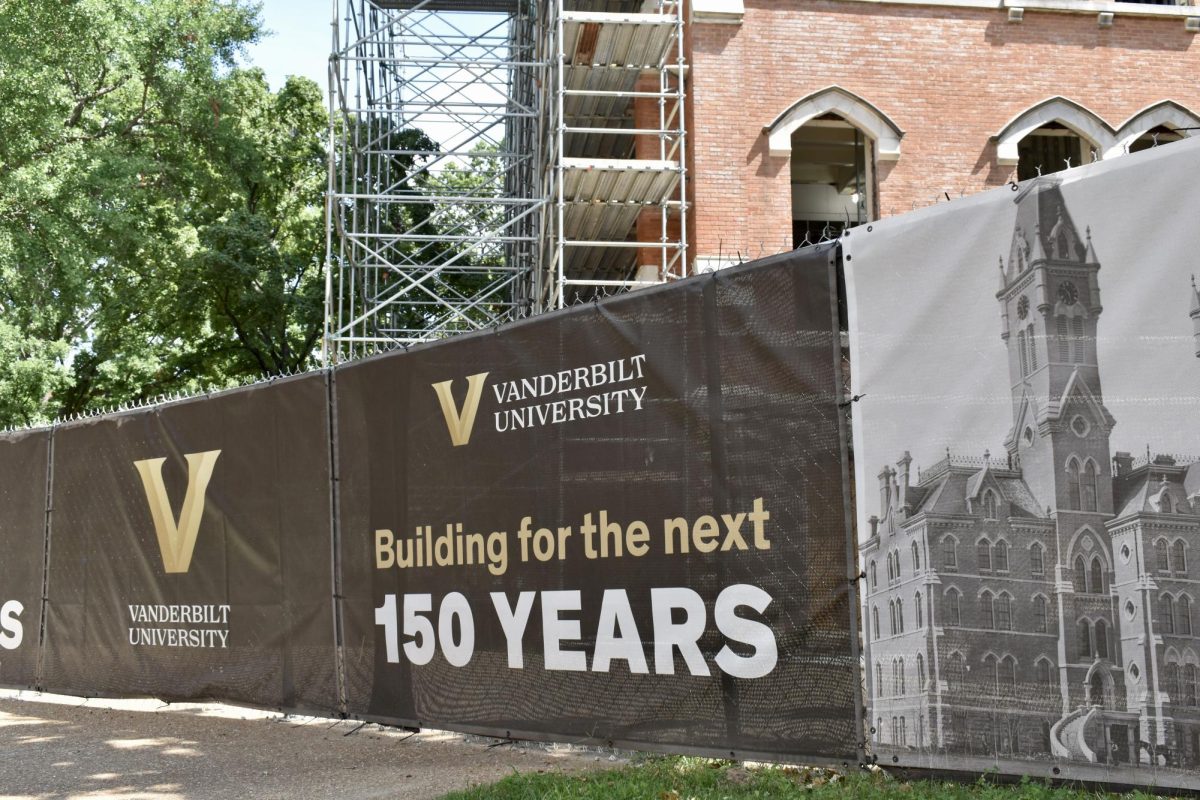
Class of 2024 • Oct 13, 2022 at 6:56 pm CDT
I’m always shocked by how out-of-touch Diermeier is. I’ve never seen him admit to a mistake, either by himself or the university. Even stellar leaders have to do that eventually—everyone makes mistakes, and acknowledgement is the first step to reconciliation/improvement—but with Diermeier, it’s always good, all the time. Is Vanderbilt the worst school? No. But it’s disingenuous for administrators to say that they always make the right decisions, and that there is no need for improvement. Like someone noted below, even our “great” financial aid leaves many students in massive debt. The email in “support” of LGBTQI students was sent, yes, but that email refrained from taking sides, leaving students facing death threats to fend for themselves. Diermeier can say that he’s doing what he was hired to, but his statements and actions are so consistently meaningless that it becomes unclear as to what exactly he thinks that is. This middle-of-the-road approach not only lacks a message, but it affects students in real, harmful ways. Which is all to say that, if Diermeier is satisfied with things as they now are, then he’s not really on students’ side at all, and there’s really no way forward with him as Vanderbilt’s leader.
Class of 2022 • Oct 11, 2022 at 1:44 pm CDT
I appreciate a lot of what he’s saying, and Vandy generally has great financial aid, but it always bothers me when they claim that every student can graduate debt-free. I graduated with over $200,000 in debt because I was paying for Vanderbilt by myself, and the financial aid office never took that into account at any point.
Class of 24 • Oct 10, 2022 at 1:28 pm CDT
You can take away our freshman year, but you will never take away our Wesley.